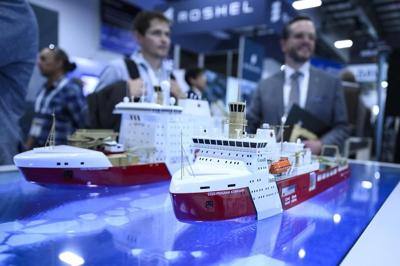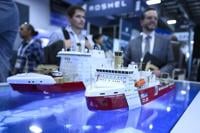MONTREAL - A Quebec shipbuilder's expansion to the United States is part of the Biden administration's renewed focus on Arctic defence — and a way to get around protectionist law dating back decades.
On Monday, the White House announced that Quebec-based Davie shipbuilding is in talks to make a "major investment" in an existing American shipyard. Davie says the U.S. government wants the company to have a presence in the country because it's a "world leader" in building icebreakers.
The development follows news earlier this month that Canada, the U.S. and Finland have formed a pact to collaborate on building polar icebreakers in an effort to counter Russian and Chinese ambitions in the Far North. The Pentagon released an updated Arctic strategy last week warning of Russia and China's increased presence in the region.
"In the overall geopolitical environment, there's a greater understanding that the Arctic is renewing its importance as a centre of geopolitical significance," said Rob Huebert, a University of Calgary professor studying Arctic sovereignty and security.
Huebert said Russia has a "significant advantage" in the number of icebreakers at its disposal, allowing it to manoeuvre more easily in the Arctic compared with the U.S. and its allies.
"Canada and the United States have had great difficulty in ever being able to … get their act together to build icebreakers," he said. "It's been a gong show, to put it politely."
Huebert said the countries want to pool resources to build the vessels, which can navigate through ice-covered waters and provide safe passage to other ships. But a major barrier is protectionist U.S. law, which requires the country's navy and coast guard vessels to be built in the United States. The legislation means Canadian companies can't build icebreakers for the United States from shipyards in Canada.
Finland's entry into NATO in 2023 marked a turning point in the Western allies' ability to collaborate on a shipbuilding strategy for Arctic defence, Huebert said, since Finland has designed about 80 per cent of the world's icebreakers. Earlier this month on the sidelines of the NATO summit in Washington, Canada signed a trilateral agreement with the U.S. and Finland, called the ICE Pact, to boost the production of icebreakers.
This week's announcement, Huebert said, is a "very important step forward" in ensuring that pact will "be something more than words."
Last year, Davie purchased Finland's Helsinki shipyard, which has built more than half the world's icebreaker fleet. "What seems to be shaping up is that this then allowed Davie shipyard to basically take that technology that they have acquired from the Finns and then build it in the United States," he said.
Davie has to have a physical presence in the U.S. to comply with the legislation. Marcel Poulin, a spokesperson for the shipbuilder, said the company is having "confidential conversations with various shipyards in the U.S." about either a partnership or an acquisition.
"The reason why the U.S. is interested in having Davie come to the U.S. market is precisely because we are the world leader in icebreakers," he said. "It's proof that no one can dispute that Davie is definitely the world leader in this niche market."
Louisiana-based Bollinger Shipyards currently has a contract with the United States Coast Guard to build three heavy polar icebreakers, the first American-built ships of their kind in more than 50 years.
Earlier this year, Davie secured an $8.5-billion government contract as part of Canada's national shipbuilding strategy to build seven icebreakers, including one polar class, and two hybrid-powered ferries. Vancouver-based Seaspan Shipyards is building a second polar icebreaker.
The developments mark a turnaround for the company, which was excluded from the federal shipbuilding plan for more than a decade. Poulin said Davie has relied on funding from the provincial government to get to this point, including $520 million to help the company modernize its shipyard in Lévis, Que., and another $110 million to help with the acquisition of the Finnish shipyard.
This week's news places Davie in a "strategically, and I would dare say economically, very significant position," Huebert said. But he added that it's hard to predict what a second Trump presidency could mean for the future of the icebreaker agreement. On one hand, he said, a future Trump administration may not believe Russia poses as much of a threat as the Democrats do. On the other hand, "the practicality and necessity of building icebreakers" could carry the day.
Poulin said he hopes the ICE Pact will convince other NATO allies to purchase icebreakers from Canadian, American and Finnish shipyards.
This report by Ïã¸ÛÁùºÏ²Ê¹ÒÅÆ×ÊÁÏ was first published July 30, 2024.








































